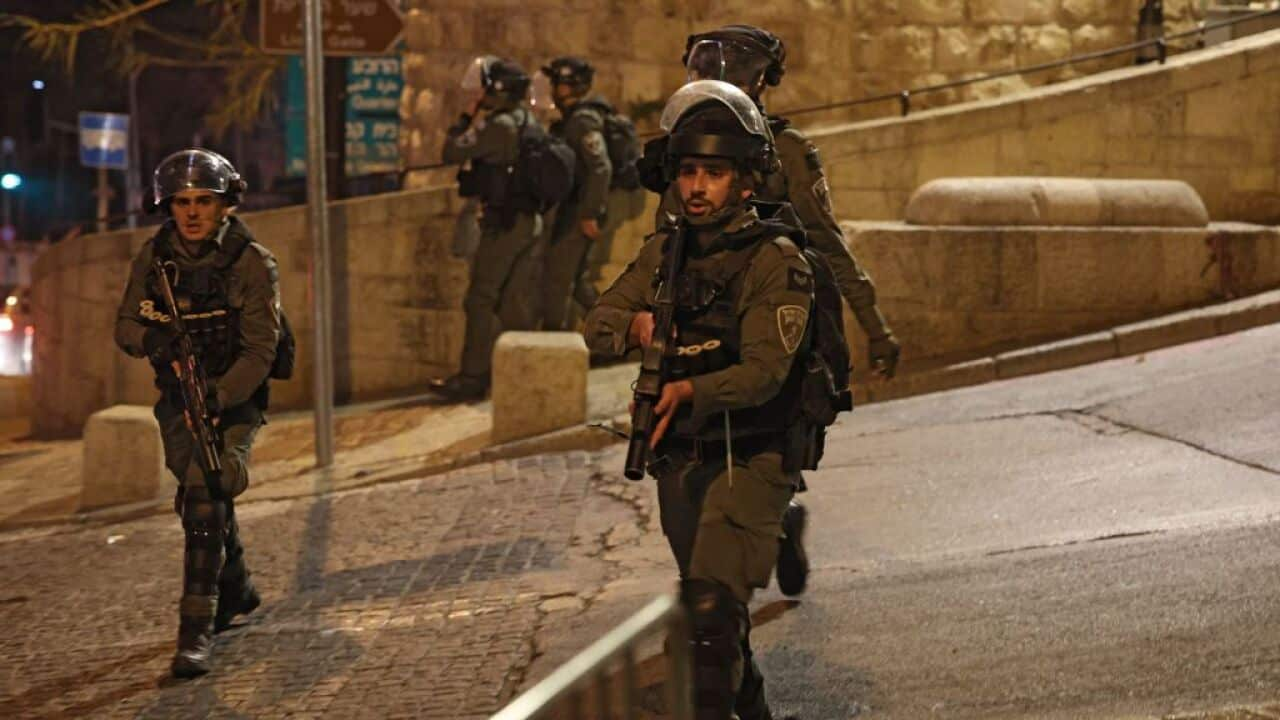Key Points
- Israeli police reportedly attacked worshippers in Jerusalem's Al-Aqsa Mosque.
- The site is located in the Old City of Jerusalem and is sacred to both Islam and Judaism.
- Israeli police said they were seeking to dislodge "Palestinian agitators" who, it claimed, had barricaded themselves in the mosque.
Al-Aqsa Mosque compound, known in Judaism as the Temple Mount, is a site sacred to both Islam and Judaism in the Old City of East Jerusalem that has long been a lightning rod in Israeli-Palestinian relations.
On Wednesday, Israeli police stormed the mosque to dislodge what they called "Palestinian agitators" who barricaded themselves inside after the last prayers of the day with fireworks, sticks and stones.
The violence at the site, which is the third-holiest in Islam and the holiest in Judaism, came after Jewish radicals called for animals to be sacrificed in the compound to mark the Jewish Passover holiday.
Violence in the occupied West Bank and Jerusalem has surged over the past year and there is concern tensions could escalate this month, as the Muslim holy month of Ramadan coincides with Judaism's Passover and Christian Easter.
So what is the significance of Al-Aqsa Mosque, and why has it been a source of conflict?
What is the history of Al-Aqsa Mosque?
The 35-acre rectangular esplanade at the southeast corner of the Old City was seized by Israel in the Six-Day War of 1967 along with the rest of East Jerusalem and later annexed. Under international law the area is considered to be occupied territory, but Israel considers it disputed territory.
Israel considers all of Jerusalem as its capital, but Palestinians want the eastern sector, which includes the Old City and its sacred sites, as the capital of any future state.

Israeli police reportedly attacked worshippers at Al-Aqsa Mosque. Source: Getty / Ahmad Gharabli/AFP
Believed to be where the Prophet Muhammad ascended to heaven on a winged horse, it is the third-holiest site in Islam after Mecca's Grand Mosque and the Prophet's Mosque in Medina, both in Saudi Arabia.
The compound in its current form was built in the seventh century on the site of the Second Jewish Temple that was destroyed by the Romans around 70 AD.
The area is revered by Jews, who come from across the world to pray at the Western Wall, also known as the Wailing Wall, a remnant of the Second Temple that is situated just below the esplanade and is the holiest site where Jews can pray.
In Hebrew, the whole area is referred to as Har HaBayit - the Temple Mount.
Who can access Al-Aqsa Mosque?
Al-Aqsa Mosque is administered by Jordan in co-ordination with the Palestinians but access to the site is controlled by the Israeli security forces.
Decades-old convention allows Muslims to enter the mosque compound at all times of day or night, but non-Muslims can only do so at certain times and are banned from praying inside.
However, in recent years Israeli police have repeatedly closed access to Al-Aqsa Mosque during times of tension and ultra-nationalist Jews, who want to begin building a new temple at the site, have been caught praying inside.
Decades of tension
The site has long been a tinderbox in the conflict between Israel and the Palestinians, with tensions often peaking during the Muslim holy month of Ramadan.
A controversial visit to the mosque compound in September 2000 by Israel's then-opposition leader Ariel Sharon was one of the main triggers for the second Palestinian intifada, an uprising that lasted from 2000 to 2005.
The day after Mr Sharon's visit, Israeli police shot dead seven Palestinian protesters.
In 2017, the compound was temporarily closed after three Arab Israelis opened fire at police near the mosque, killing two of them, before fleeing into the compound, where they were shot dead by security forces.
Two years later, clashes between police and worshippers at the compound left dozens of Palestinians wounded.
During Ramadan in 2021, Israeli police stormed Al-Aqsa Mosque to end a sit-in by worshippers - events that led up to an 11-day war between Israel and the Gaza Strip's rulers Hamas.
The compound was the site of renewed clashes during the spring of 2022 that left hundreds of Palestinians wounded.
In January, a visit by Israel's extreme-right National Security Minister Itamar Ben-Gvir also caused tensions.










